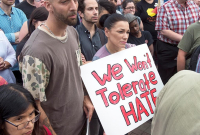Support strong Canadian climate journalism for 2025
Work began Wednesday to remove a statue of Halifax's controversial military founder from a downtown park, less than a day after Halifax council decided it should be taken down at least temporarily.
Scaffolding was set up around the bronze figure of Edward Cornwallis, as workers prepared to move it.
"I feel like my ancestors can finally rest. It's a great day to be Canadian and First Nation," said Isaiah Bernard, from Nova Scotia's Potlotek First Nation.
He said he has always avoided driving by the statue on his way to the nearby Saint Mary's University, and was relieved to see it come down.
"Every time I look at and think of Cornwallis, I just think of the scalping of my people, the planned genocide he did," he said.
A few bystanders gathered around the statue under sunny skies, but it was unclear when the statue would be uprooted and moved into storage.
Council voted 12-4 on Tuesday to temporarily place the bronze figure in storage until a decision is made on its long-term fate.
Nova Scotia Mi’kmaq chiefs had called Friday for the statue to be taken down immediately, because a panel appointed in October to study how the city commemorates Cornwallis had not even met yet.
Mi'kmaq activist 'pretty happy'
Cornwallis is a disputed character seen by some as a brave leader who founded Halifax, but by others as the commander of a bloody and barbaric extermination campaign against Mi'kmaq inhabitants.
"I feel pretty good right now, pretty happy. A lot of us, we've been waiting a long time for this — since longer than I've been alive," Mi'kmaq activist Rebecca Moore said as she watched workers make preparations for removal.
"What it means to me is that it's really showing that violence against Indigenous people and Indigenous women is not OK and it's not acceptable and that we won't stand for it. That's what it symbolizes to me."
By mid-afternoon, a chain-link fence had been set up around the statue and a truck with a crane was parked beside it.
Leo Deveau, director of the Halifax Military Heritage Preservation Society, said he feels that "Cornwallis has become a lightning rod for a number of things, which we think is unfair."
"It's not just about Cornwallis. He came with 2,500-plus people, settlers, and many of whose names exist in the city today. That's what has drawn me into this for a long time — the stories of those settlers," he said over the sound of a saw cutting into the base of the statue.
But he said going forward, a balance could be struck to reflect on Halifax's entire history.
"There's been some interesting, constructive proposals around the idea of having a founding park that would represent not only the Cornwallis era, but the Acadians, the Mi'kmaq and other founding groups that came into this settlement," he said.




Comments